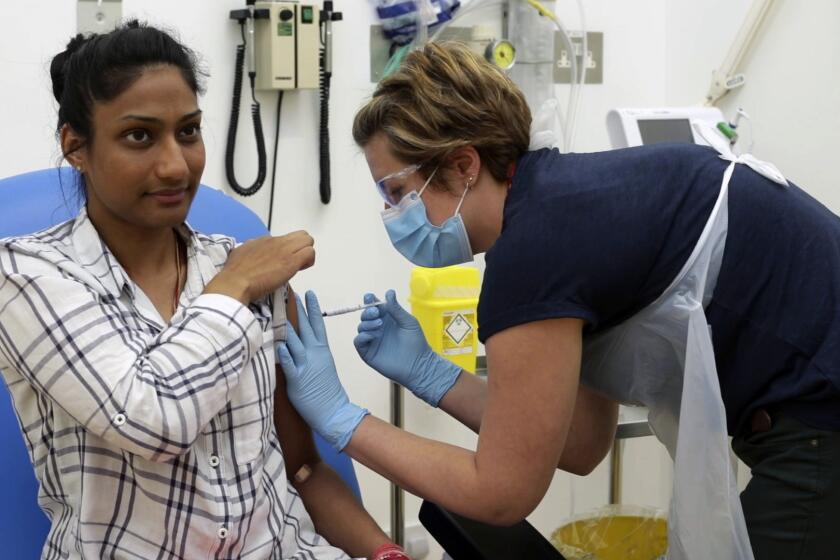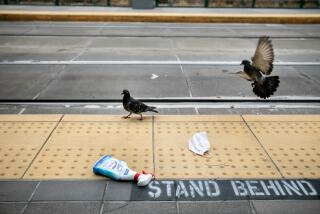Column: We won’t end COVID-19 with ‘test and trace’
- Share via
WASHINGTON — To hear public health experts describe it, defeating the coronavirus is a massive but straightforward problem, difficult but not impossible while waiting for a vaccine.
First, administer tens of millions of tests to find out who has the disease. Then trace all their recent contacts, using a cellphone app that tells the government whom they met. Finally, track down all those people and order them into isolation for 14 days, possibly in a quarantine hotel.
Now think about that scenario.
President Trump outlined what he called a “warp speed” effort to develop and deploy a COVID-19 vaccine by year’s end. Even those leading the effort say chances of meeting that deadline are low.
In a country where armed men are marching to defend their right not to wear masks, how will intrusive measures like those go down?
Answer: Not easily.
“My public health friends are working out brilliant solutions for the technical problems, but they haven’t confronted the challenge of political culture,” Keith Humphreys, a professor of psychiatry at Stanford’s Medical School, told me.
“What are we going to do if millions of people refuse to take the tests? What are we going to do if they refuse to isolate themselves or close their businesses?”
He’s right. Our political culture often puts individual rights before communal interests. We’re not obedient people by heritage; the Constitution enshrines our right to rebel.
That’s not a complaint. Our small-L libertarian streak, by which I mean our attachment to the Bill of Rights, is one of the glories of American life.
But in the face of a pandemic, it gets in the way of protecting the larger community.
We’ve already seen widespread protests against the shutdown orders imposed by many governors — protests encouraged, bizarrely, by President Trump, even though the governors are following White House guidelines.
There’s been scattered violence by hotheads who refuse shop owners’ requests to wear masks.
A security guard at a Family Dollar store in Flint, Mich., was shot and killed after he ordered a maskless customer to leave. A clerk at a Target in Van Nuys ended up with a broken arm after he was slugged by another mask-averse knucklehead.
Even before widespread contact tracing has begun, some have denounced the idea — especially the proposed phone app — as an unwarranted data grab by Google and Apple.
And conspiracy theorists are busy denouncing the pandemic as a hoax cooked up by Bill Gates, the Democratic National Committee, or some other imaginary supervillain.
The resistance to masks and other public health measures, while noisy, is still a small minority. A poll released by the Washington Post and the University of Maryland last week found that only 11% of Americans think the anti-pandemic measures have been too severe, including only 32% of Republicans.
Still, “it doesn’t take much noncompliance to create problems,” Humphreys pointed out.
Smart public health planners are already thinking about making the next stage work, including how much to ask of those who may have been exposed to the virus.
“I don’t think you necessarily want to ask people to quarantine for 14 days,” Ashish Jha, director of Harvard’s Global Health Institute, told me.
“I could see a system that asks people to self-isolate for three to five days, gives them a couple of tests, and if both are negative tell them they are OK as long as they avoid large gatherings,” he added. “Is that the ideal scientific outcome? No. But we can live with it.”
Bottom line: We’ll never see 100% compliance, but we don’t need it. If doctors can get 60% or 70% to cooperate, the contagion can still be contained — just more slowly.
That means a long, uneven slog toward reducing the danger, with some states imposing tougher measures than others — a crazy quilt of slightly different approaches.
That creates problems too. People are still largely free to travel from one state to another, which gives the virus more ways to spread. As Humphreys put it, “it’s like building a no-peeing section in the swimming pool.”
And all this is merely awaiting an effective vaccine to protect people from the virus. Did I mention that the anti-vaccine movement has roared back to life, denouncing Trump’s call for a crash program to develop, test and deploy 300 million doses by January as another dangerous plot?
Thanks to the anti-vaxxers, even an effective vaccine is unlikely to eradicate COVID-19 completely because some Americans will choose to remain vulnerable to it. In that respect, it will be something like the measles — a threat that came back because some families refused the vaccinations.
We’ll still contend with the coronavirus years from now — and still argue about the appropriate public health measures to employ.
We’re not like South Korea or Taiwan. We’re not even like Canada or Germany, countries where people trust government more than we do.
We’re America, and we’re going to do it our way — no matter how long it takes and how many mistakes we choose to make.
More to Read
Get the L.A. Times Politics newsletter
Deeply reported insights into legislation, politics and policy from Sacramento, Washington and beyond. In your inbox three times per week.
You may occasionally receive promotional content from the Los Angeles Times.












